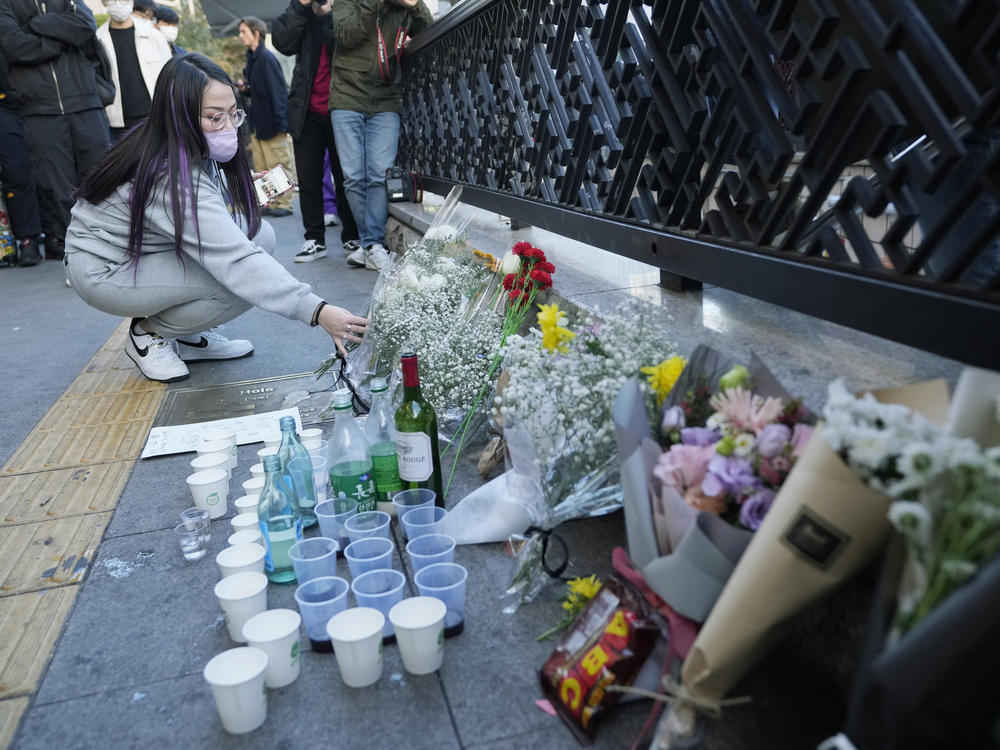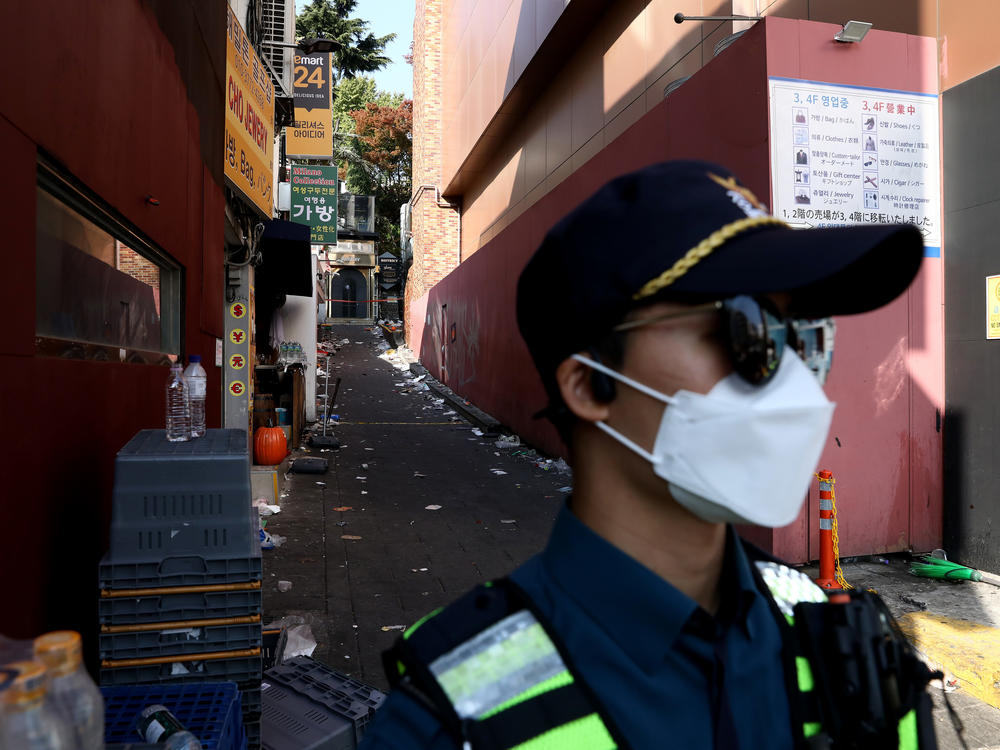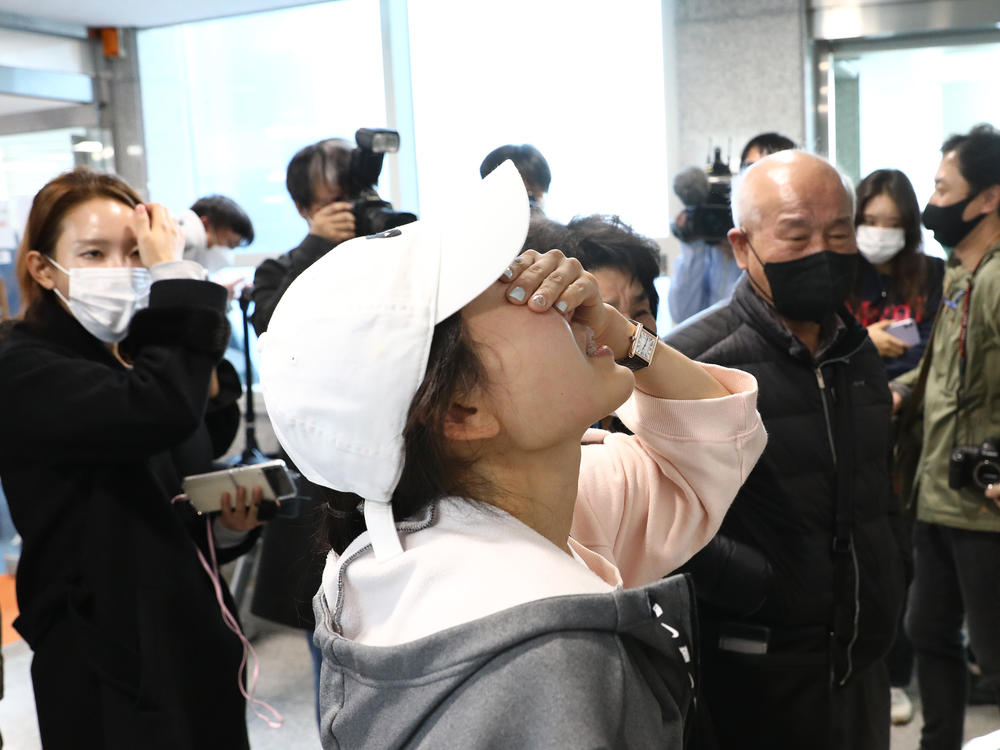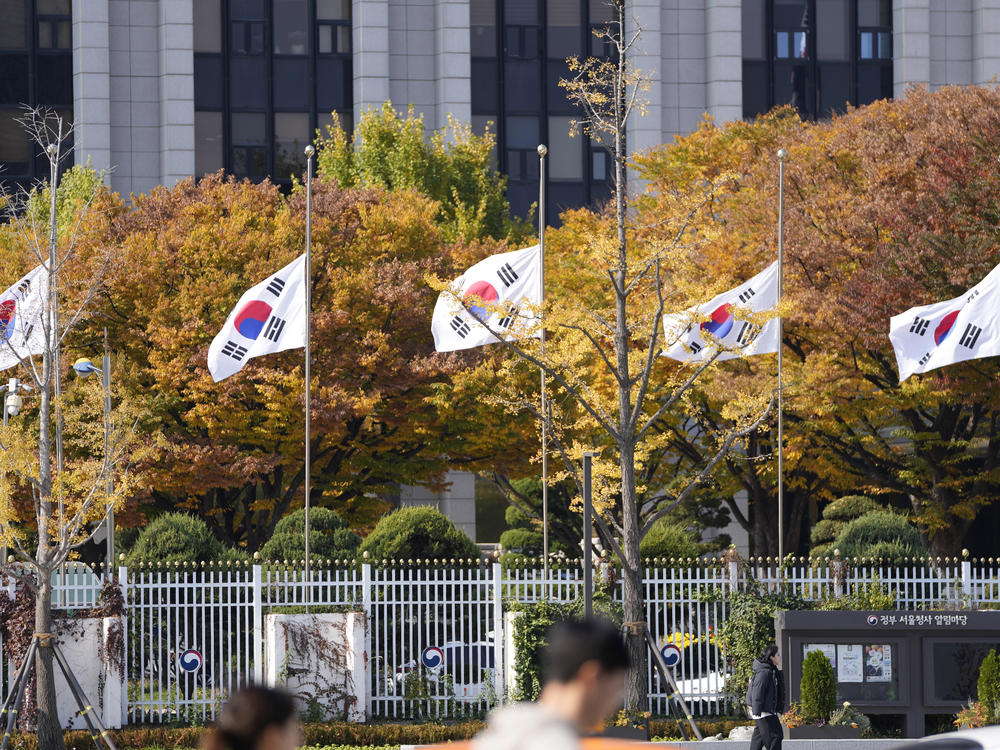Section Branding
Header Content
Survivors recount chaotic scene in Seoul during tragic Halloween stampede
Primary Content
Updated October 30, 2022 at 4:04 PM ET
In the hours since a devastating crowd surge in South Korea's capitol claimed the lives of more than 150 people, details have begun to emerge that emphasize just how chaotic the scene was.
Authorities say that in addition to the dead there are more than 130 others injured, many of whom were young adults in Seoul's Itaewon neighborhood. The popular district in Seoul was hosting Halloween celebrations that drew around 100,000 people when the crowd surge began. Many were attempting to gather in a narrow alley filled with bars and restaurants, according to local media.
Videos have popped up online showing the sheer mass of people crowded into at least one tight street lined with bars and restaurants. Some people can be heard screaming, and most appear completely unable to move.
One worker at an Itaewon club, located at the uphill end of the roughly 11-foot-wide alley leading to the district's main street, recalled to reporters seeing the crowd of revelers surge on Saturday night.
"We could hear some people in the crowd saying, don't push, but someone in the back said, hey, push! Push! And people started screaming, and the crowd poured in toward our club," he said.
The man, who declined to give his name to reporters, said they would ordinarily not let minors into their club, but they opened their doors to try to save lives.
"But even after we did that, there were people collapsed at the entrance, and some passed out," he added. "We tried to rescue them, but our club was at the end of the surge and there were already three or four layers of people piled on, so we couldn't."
He said his inability to help people "keeps haunting me, and pains me."
Other videos shared on social media show several people, some clad in their Halloween costumes, attempting CPR on rows of victims unconscious on sidewalks.
Survivors struggle to locate friends
Most of the dead had been identified by mid-morning on Sunday. The task was simplified by the fact that Korean citizens over the age of 17 are required to submit fingerprints to authorities.
Koreans and foreign nationals who are missing friends and relatives came to a nearby community center to try to identify pictures of the victims.
Park Kang-hyun, 26, traveled to Seoul from Gwangju city, in the country's southwest, in search of two missing friends. One lost her cell phone but survived, he said. The other remains missing.
The friend who survived said "there were just too many people. They didn't even have a moment to feel scared. Everyone just fell down."
He continued to search for his other friend, but city officials "just told me to wait. There's nothing we can do now."
Nathan Taverniti, 24, was on vacation from Australia. He told reporters he was in Itaewon with three friends.
"I was there the whole night. Some people fell in front of me, and I lost a group of my friends," he said. "Somehow, I got out, but all three of my friends ... two are in hospital, and one has passed away," he said, fighting back tears.
"There was no police. There was nobody to help me," he said. "It was just me and other bystanders. And I couldn't do anything."
In the aftermath of the crowd surge, questions have begun to surface over whether more police should've been dispatched to the area to help control the large crowds. The Korean Herald reports that emergency crews nearby had trouble getting to the scene and to the hundreds of victims given the crowds and added traffic congestion.
Interior Minister Lee Sang-min has pushed back against the idea more could've been done to prevent the tragedy, according to The Korean Herald. The outlet quotes Lee saying that the crush did not seem to be "an incident that could have been prevented by deploying more police or fire officers."
The Halloween event had been held before and according to local media reports there was no concern that crowds would be a particular problem this year or any larger than previous events had been.
Two Americans are among the dead
At least two U.S. citizens were among those killed in the deadly crowd surge, the U.S. embassy in Seoul has confirmed.
"I am deeply saddened by the loss of so many lives last night, to include two young Americans celebrating alongside their Korean friends and others from around the world," U.S. Ambassador to the Republic of Korea Philip Goldberg said in a statement.
In a statement on Twitter, President Biden also offered his condolences.
"Jill and I are devastated to learn that at least two Americans are among so many who lost their lives in Seoul. Our hearts go out to their loved ones in this time of grief, and we continue to pray for the recovery of all who were injured," the president said.
One of those individuals who died was University of Kentucky student Anne Gieske, the school announced Sunday. Gieske was a junior nursing student from Northern Kentucky who was studying in South Korea as part of an education abroad program.
Two other students and a faculty member, who are also in South Korea for the semester, were contacted and are confirmed to be safe, the university said.
"We will be there for those in our community who knew and loved Anne. We also have nearly 80 students from South Korea at UK — members of our community — who will need our support," Eli Capilouto, the university's president said in a statement to the school community.
As of 9 p.m. Sunday local time, officials say at least 26 foreign nationals were killed in the incident, according to local media reports.
The U.S. Embassy in Seoul is working with local authorities and providing consular assistance to any U.S. citizens affected, a spokesman told NPR.
In response to the tragedy, South Korea Prime Minister Han Duck-soo announced a period of national mourning to last until midnight on Nov. 5.
The government has declared Seoul's Yongsan district, where Itaewon is located, a special disaster area. Under this designation, the government will pay funeral fees for the dead, medical costs for the injured, and consolation payments to bereaved families.
NPR's Se Eun Gong contributed to this report from Seoul.
Copyright 2022 NPR. To see more, visit https://www.npr.org.




